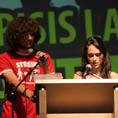




 Following, we document the address of comrade Stefan (RIO Berlin) to the International Act of the Trotskyist Fraction commemorating the assassination of Leon Trotsky 70 years ago on August 22nd, 2010, in Buenos Aires, Argentina.
Following, we document the address of comrade Stefan (RIO Berlin) to the International Act of the Trotskyist Fraction commemorating the assassination of Leon Trotsky 70 years ago on August 22nd, 2010, in Buenos Aires, Argentina.
Transcript of Stefan’s speech
Dear comrades,
I send you greetings of solidarity from Berlin, where I am activist of RIO, the Revolutionary Internationalist Organization. This event is being broadcast in Berlin as well, so I want to take this opportunity to send revolutionary greetings to my comrades at home as well.
In Germany, the bourgeoisie has been discussing for months about the best way to confront the ongoing economic crisis. They agree that this should be done principally via attacks on the working class. Disagreement exists only regarding the speed and the scale of the attacks.
So far, the „social partnership“ with the trade unions is being maintained, which is why the attacks are concentrated on the weakest parts of the working class such as precarious and unemployed workers. But at the same time, there are rhetorical preparations for further attacks on the working population.
Meanwhile, the Social Democracy is completely passive. They don’t have the slightest answers to the crisis and show no will to mobilize the masses. After all, they carried out the majority of the attacks on the working class in the last ten years themselves. The first signs of combativity by the most advanced sectors of the working class are being answered by the trade union bureaucracy with repression and even expulsions.
In addition to the economic crisis, there is also a serious crisis of the educational system in Germany, against which hundreds of thousands of students have protested in the streets in recent months and years. Big demonstrations and dozens of occupations took place, but they were dominated entirely by reformist demands.
We from RIO tried to intervene in the students’ protests at one of Germany’s biggest universities, the Free University of Berlin, with a revolutionary Marxist program. The main focus of our intervention was uniting the students’ protests with the struggles of the working class. In this sense, we actively supported the strike of the building cleaners and the strike of the cafeteria workers. Moreover, we began a limited but systematic work with the cafeteria workers after the strike.
With our intervention we could give an idea of the power that united struggles of workers and students can have. But the ideological strength of reformism and the organizational weakness of Marxism contributed to the fact that in all of Germany there were only a few isolated actions like ours.
Because of that, we regard the construction of strong revolutionary Marxist organizations in the universities and in the factories as our most pressing task. There is very little inspiration from successful struggles in Germany, but the struggles at Zanon and Kraft-Terrabusi, led by the FT, can inspire and show us how the struggles of students and workers can be connected.
In this sense, we worked very closely with the FT comrades in Germany in the past months and published pamphlets on Zanon and the German student protests, and also held a seminar on the struggle at Kraft-Terrabusi and other examples of progressive struggles in Latin America.
In the future, we want to continue to work intensively with the FT, on a programmatic as well as a practical level. In this sense we proposed the formation of a liaison committee to the FT Conference in order to advance in the construction of a strong revolutionary Marxist organization in Germany and world-wide.
Long live international solidarity!
Leave a Reply
